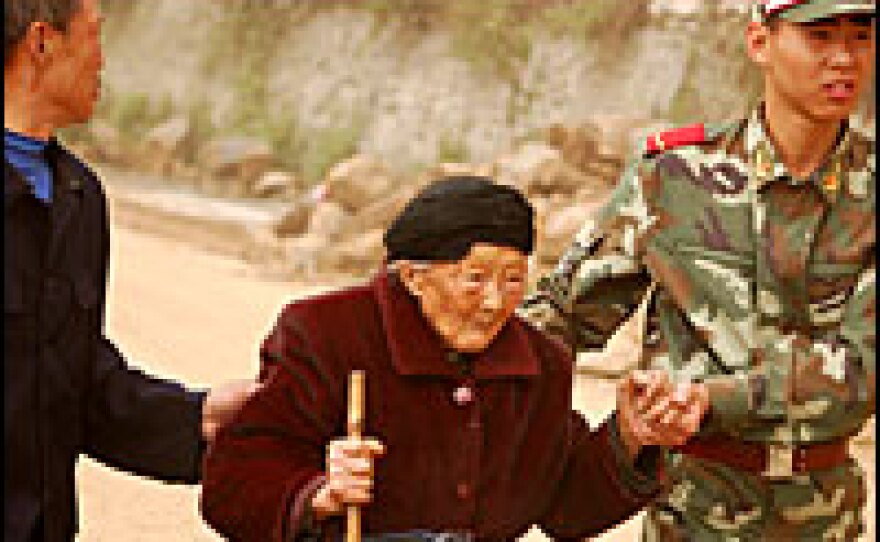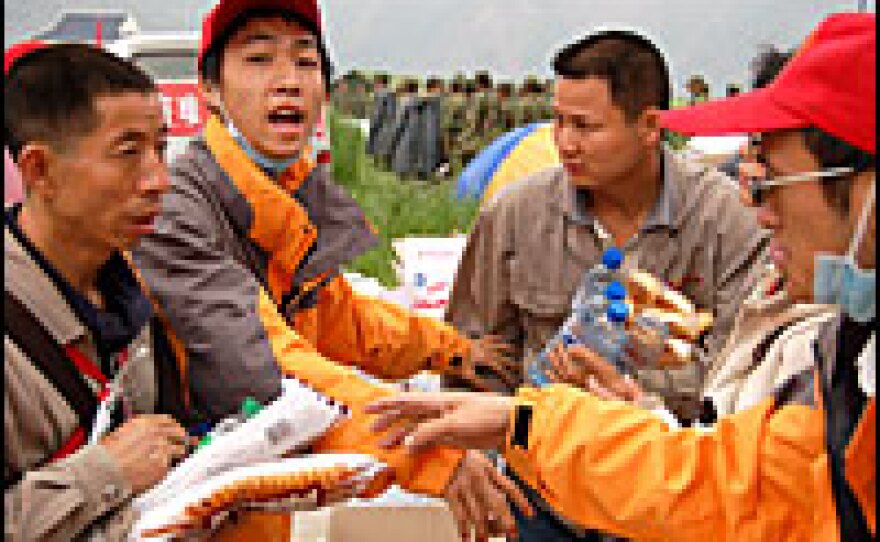


The rescue effort in China has turned toward helping those who survived Monday's earthquake and retrieving bodies from the rubble. The number of known dead has gone up sharply to about 20,000, with many thousands still missing, and now the safety of the area's dams is in question.
On Thursday, the minister for water resources, Chen Lei, warned that the magnitude 7.9 quake has caused extensive damage to the dams, and the hazards are unclear. One particular dam is at the center of concerns — and also at the center of the relief operation.
At Zipingpu dam, where the quake opened cracks in the dam wall, fears emerged that the dam might not hold, potentially endangering a city of a half-million people downstream.
But an official called Mr. Hu who is coordinating the repair effort assures that the dam is safe.
"Those cracks aren't dangerous," he says. "When the ground shook, the dam changed shape. Those cracks are within the limits of the dam's design specifications."
'We Want to Save People'
Safety aside, the dam upstream from Dujiangyan is the staging post for rescuers heading toward the epicenter. Here, a team of firemen clad in orange jumpsuits receive their last pep talk. They're carrying ropes, poles, water and huge power saws. They're from Jiangxi province, on the other side of the country, and have already traveled a thousand miles to be here.
Like them, many of the relief workers have come from afar to help out. Everybody wants to do their bit.
As the firemen set off, they know the road ahead is blocked by landslides. They're heading in on foot, walking for many hours.
"We're all very eager. We all want to go to the front line," says fireman Liu Lui. "We want to save people. But in my heart, I'm a little scared of what I might see."
The military is also here. Whole platoons of soldiers in camouflage gear are told to run as they head toward the stricken area. They grab bottles of water and loaves of bread from volunteers as they head out.
Barely out of their teens, with canvas sneakers on their feet and little in the way of equipment, they hardly seem equipped to deal with the devastation ahead.
Time Off Work to Assist Relief Effort
Tan Jiquan is among those handing out water to the soldiers. He is the owner of a computer company. He has given his entire staff of 47 people two weeks off work to help out with the disaster effort. Asked about the economic losses, he shrugs.
"That doesn't matter. When such a big disaster befalls the entire country, as a patriot, it's my duty to take part in the relief effort," he says.
On the dam, an elderly survivor listens to the news on a transistor radio. The government made a radio appeal Thursday for donations of rescue equipment, including basic tools, such as shovels, and demolition equipment. They also need medical supplies, including gauze and bandages.
Groups of dazed people in mud-caked shoes straggle down the mountainside, some limping. They've walked out from the places worst hit by the earthquake.
Surviving with Nothing
Xie Gang is sitting by the roadside, gulping down bread from the volunteers. He has just come to collect supplies, then he is heading straight back up the mountain to Wangjiang village.
"We've got nothing. No food, no water, no medicine. After the earthquake, it rained a lot and many of the old people and children are running fevers. So we want to take medicine back," he says.
At a hospital tent, a doctor is treating another child for a fever. In his township, Xie Gang says, almost all of the buildings have been flattened. A number of people are still missing, buried in the rubble.
But now, on Day Four after the earthquake, these survivors are no longer expending energy trying to rescue those buried. Instead, they're figuring out what to do next — how to look after the living, and how simply to survive when they have nothing at all.
Copyright 2022 NPR. To see more, visit https://www.npr.org. 9(MDAzMjM2NDYzMDEyMzc1Njk5NjAxNzY3OQ001))







